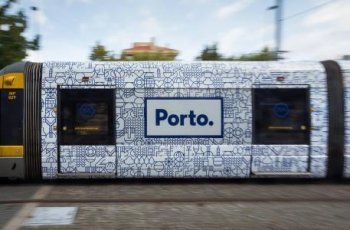Porto Metrobus attracts 4 million passengers by 2024

ECO
· 11 Aug 2022
The Porto metrobus is expected to attract four million passengers to other means of transport in 2024, according to a study by Metro do Porto.
The Porto metro bus is expected to attract almost four million passengers from individual transport and other public transport in 2024, according to a cost-benefit analysis study conducted for Metro do Porto and consulted by Lusa.
According to the June study, conducted by the company Trenmo, headed by university professor Álvaro Costa, the Bus Rapid Transit (BRT, aka metrobus) between Casa da Música, Praça do Império and Praça Cidade do Salvador (Anémona), will capture 3.96 million passengers to other transport in 2024.
The document, available on Metro do Porto's website, indicates that, in 2024, the demand for individual transport passengers, relative to "passengers who currently travel by car but who will use public transport, namely the new Metro do Porto service, totally or partially", will be 3,7 million passengers.
On the other hand, the number of passengers picked up by another type of public transport other than Metro do Porto (Sociedade de Transportes Coletivos do Porto [STCP], private operators and CP - Comboios de Portugal) will reach 255 thousand passengers.
In total, the study indicates that in 2024 3,96 million passengers will be removed from other transports, which represents a daily average of 10.832 that year, according to Lusa's calculations.
The induced demand, relative to "passengers that currently do not move but, as a result of Metro do Porto service improvement, start to move" in the service, is estimated in 212 thousand passengers in 2024.
In total, considering the construction of the BRT line in Porto, Metro do Porto service registers an additional demand of 9,2 million passengers in 2024, when compared to the scenario of not building the new transport service.
The study scenario includes adjustments to the current network of Sociedade de Transportes Coletivos do Porto (STCP) - which partially coincides with the future BRT route - with part of lines 201, 502 and 503 having been removed from the analysis.
The document also estimates figures for 2027, in which the number of passengers picked up by other means rises to 4,4 million (4,1 for individual transport and 283 thousand for other public transport), the induction of new passengers rises to 236 thousand and Metro do Porto registers an additional demand of 10,2 million.
There are also forecasts for 2041 (an increase of 11,9 million passengers) and 2051 (an increase of 13,8 million).
In the economic and financial component, the project "presents a positive financial return, with a NPV(c) [net present financial value] of 32 million euros and an IRR(c) [internal financial rate of return] (4.9%) higher than the financial discount rate", of 4%.
The project is also estimated to have a positive economic return, with an economic net present value (NPV) of €857 million and an economic internal rate of return (eIRR) of 11.5%, "higher than the social discount rate (5%)".
"This means that the project generates economic, social and environmental benefits greater than its costs, which justifies its implementation," the document points out.
The Porto metrobus, a new hydrogen road transport, mostly on dedicated track, with a cost of 66 million euros fully supported by the Recovery and Resilience Plan (PRR), will see the works advance on the ground "soon," according to an official source of Metro do Porto, questioned Monday by Lusa.
On May 24, the president of Metro do Porto, Tiago Braga, had pointed to the month of July for the start of work, also admitting August as a possibility, aiming to have the work completed "on December 31, 2023".
The stations Casa da Música, Guerra Junqueiro, Bessa, Pinheiro Manso, Serralves, João de Barros and Império, in the first service, are planned, and in the section until Matosinhos, Antunes Guimarães, Garcia de Orta, Nevogilde, Castelo do Queijo and Praça Cidade do Salvador are added.


